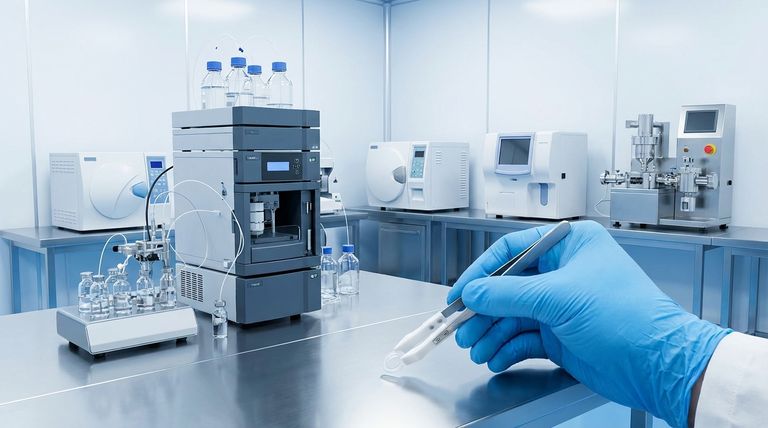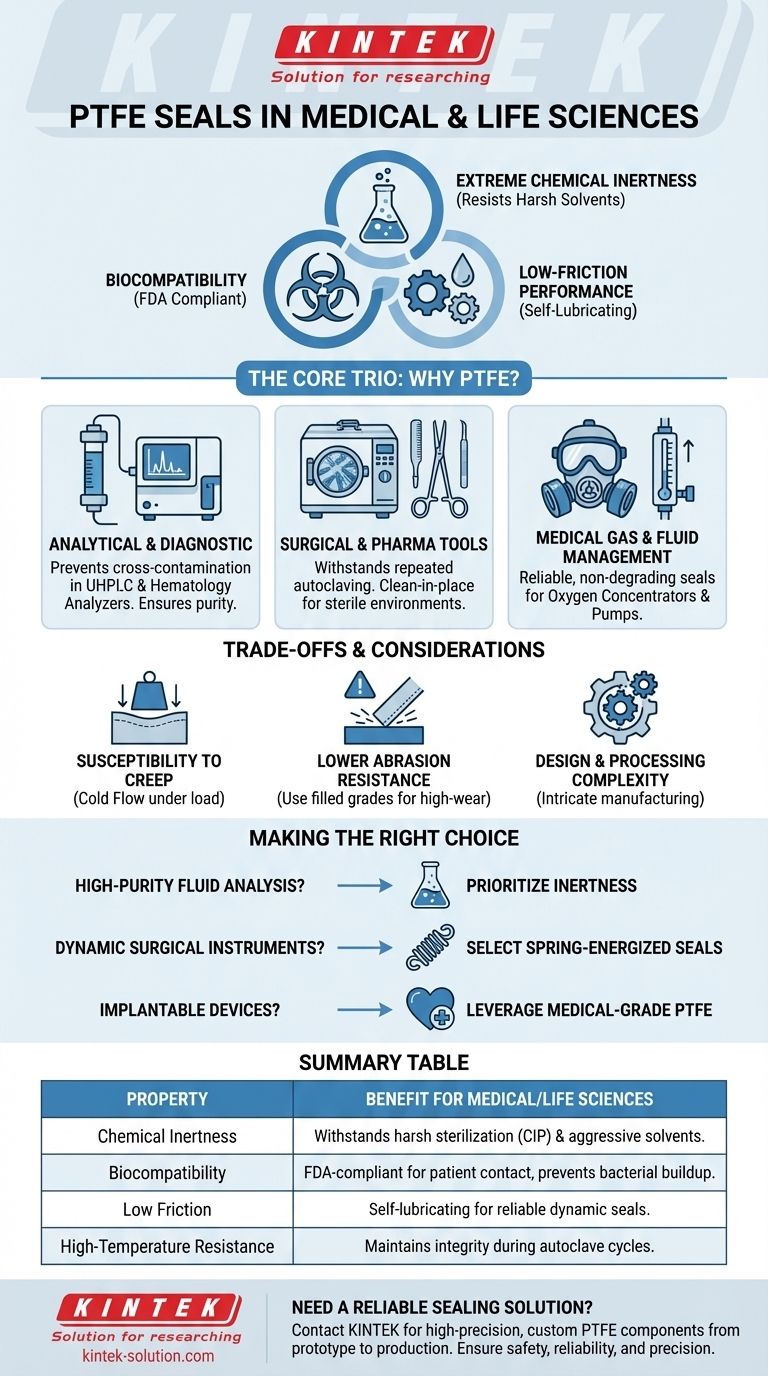In the demanding world of medical and life sciences, PTFE seals are essential components in a wide range of critical equipment. They are specified for use in high-performance liquid chromatography (UHPLC) systems, reusable surgical tools, autoclaves, hematology analyzers, oxygen concentrators, and various pieces of pharmaceutical processing equipment due to their unique material properties.
The selection of PTFE for medical seals is not based on a single attribute, but on its unique combination of biocompatibility, extreme chemical inertness, and low-friction performance, making it indispensable in applications ranging from high-pressure analytics to sterile surgical environments.

Why PTFE is a Cornerstone Material in Medical Devices
The suitability of Polytetrafluoroethylene (PTFE) stems from a set of properties that directly address the core challenges of medical and life science applications: sterility, precision, and reliability.
Unmatched Chemical Inertness
PTFE is virtually inert to almost all industrial chemicals and solvents. This makes it ideal for seals in equipment that handles aggressive fluids or must undergo harsh sterilization and clean-in-place (CIP) procedures without degrading.
Superior Biocompatibility
Medical-grade PTFE is highly biocompatible and complies with FDA regulations for use in medical devices. This allows it to be used in applications with direct patient contact, such as grafts, medical instruments, and liners for components like catheters to help prevent bacterial buildup.
Extremely Low Coefficient of Friction
PTFE has one of the lowest friction values of any solid material, making it inherently self-lubricating. This is critical for dynamic seals in moving parts, such as those in pumps, actuators, and surgical tools, where it ensures smooth operation and minimizes wear.
Key Applications in Medical and Life Sciences
PTFE's properties make it the material of choice across several distinct categories of medical and scientific equipment.
Analytical and Diagnostic Instrumentation
In UHPLC systems and hematology analyzers, seals must prevent cross-contamination between samples and withstand high pressures and a variety of chemical solvents. PTFE's inertness and robust sealing capability ensure the purity and accuracy of analytical results.
Surgical and Pharmaceutical Tools
Reusable surgical instruments must endure repeated sterilization cycles in autoclaves, which involve high heat and pressure. PTFE seals maintain their integrity in these conditions. In pharmaceutical equipment, their ability to be cleaned in place is essential for maintaining sterile production environments.
Medical Gas and Fluid Management
Devices like oxygen concentrators rely on seals that will not degrade, contaminate the gas stream, or fail over time. PTFE provides the necessary chemical stability and long-term reliability for managing the flow of medical-grade gases and fluids.
Understanding the Trade-offs
While highly effective, PTFE is not a universal solution. Acknowledging its limitations is key to proper material specification.
Susceptibility to Creep
Under a constant, prolonged load, PTFE can be subject to "creep," or cold flow, where the material slowly deforms. This must be accounted for in the design of high-pressure static seals to prevent eventual leakage.
Lower Abrasion Resistance
Compared to harder plastics, unfilled PTFE can exhibit higher wear rates in high-speed, high-load dynamic applications. In these cases, filled PTFE grades are often used to enhance mechanical strength and wear resistance.
Design and Processing Complexity
Manufacturing intricate components from PTFE can be more complex and costly than with other polymers. This can influence the design feasibility and final cost of the medical device component.
Making the Right Choice for Your Application
Selecting the correct sealing solution requires aligning the material's strengths with the primary demands of the device.
- If your primary focus is high-purity fluid analysis (e.g., UHPLC): Prioritize PTFE for its chemical inertness to prevent sample contamination and ensure accurate, repeatable results.
- If your primary focus is dynamic surgical instruments: Select spring-energized PTFE seals for their low friction, reliability, and ability to withstand repeated sterilization cycles.
- If your primary focus is implantable devices or patient contact: Leverage medical-grade PTFE for its proven biocompatibility and compliance with stringent FDA regulations.
Ultimately, understanding these properties allows you to specify a sealing solution that guarantees safety, reliability, and precision in critical medical environments.
Summary Table:
| Property | Benefit for Medical/Life Sciences |
|---|---|
| Chemical Inertness | Withstands harsh sterilization (CIP) and aggressive solvents. |
| Biocompatibility | FDA-compliant for devices with patient contact, prevents bacterial buildup. |
| Low Friction | Self-lubricating for reliable dynamic seals in pumps and surgical tools. |
| High-Temperature Resistance | Maintains integrity during autoclave sterilization cycles. |
Need a reliable sealing solution for your medical device or laboratory equipment?
At KINTEK, we specialize in manufacturing high-precision PTFE components, including seals, liners, and custom labware. Our expertise is crucial for the semiconductor, medical, laboratory, and industrial sectors, where precision and material integrity are non-negotiable.
We can provide the exact PTFE seals you need, from prototypes to high-volume production, ensuring they meet the demanding requirements for sterility, chemical resistance, and performance in your application.
Contact our experts today to discuss your project requirements and discover how our custom fabrication can enhance the safety and reliability of your products.
Visual Guide

Related Products
- Custom PTFE Parts Manufacturer for Teflon Parts and PTFE Tweezers
- Custom PTFE Sealing Tapes for Industrial and High Tech Applications
- Custom PTFE Parts Manufacturer for Teflon Containers and Components
- Custom PTFE Sleeves and Hollow Rods for Advanced Applications
- Custom PTFE Bottles for Diverse Industrial Applications
People Also Ask
- What are the future considerations for machining Teflon? Mastering Material Challenges with Smart Tech
- What are the main advantages of using PTFE parts in industrial applications? Unlock Unmatched Chemical Resistance and Reliability
- What are the key advantages of PTFE? Unmatched Performance for Extreme Environments
- What are the best practices for achieving tight tolerances in Teflon (PTFE) machining? Master Precision for Demanding Applications
- What industries use PTFE machined parts and for what applications? Critical Components for Demanding Environments



















